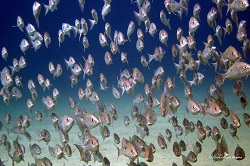All aboard for better marine stewardship through research and innovation
When we speak of the maritime environment, we often do so in language which conjures up notions of a strange and somewhat unknown environment, where much is hidden. This has led some to claim that the seas – not space – represents the last true frontier. When it comes to efforts such as determining the prevalence and impact of maritime pollution or the search for novel lifeforms, it is clear that much does indeed remain unexplored.
Coordinated efforts for resource management
The EU’s approach to maritime activities is centred on the inter-connectedness of marine-based human activities. Integral to this approach is a sensitivity of the fact that changes to one aspect of the system can affect others. Additionally, various authorities have been encouraged to cooperate, for example with the sharing of data across policy areas, which can result in more holistic risk assessments and solutions. Alongside joined-up working, the key to success will be the availability of timely data, afforded by cutting-edge bio-sensors and automation advances, which can offer early-warning protocols. In tandem, there is a need to put into practice sustainability resource management principles, with approaches such as the recirculation or repurposing of materials. A better understanding of environmental processes, biodiversity, the impacts of human activities (land-based and marine) and of climate change, including sea-level rise, as well as the socio-economic impacts of marine protection, requires a multi-disciplinary approach. As such, EU programmes such as FP7 and Horizon 2020 have been providing the necessary funding to exciting research initiatives across Europe.
Navigating developments in EU maritime research
This Results Pack features 12 such innovative projects, such as the SMS(opens in new window) and BRAAVOO(opens in new window) projects that both set out to tackle the challenge of detecting traces from a range of marine pollutants, with biosensor equipment which can transmit results in real-time, supporting the decision making of the seafood industry and environmental authorities. SEA-ON-A-CHIP(opens in new window) took a similar approach by developing an early warning system for common contaminants affecting health and the environment. SEA LITTER CRITTERS(opens in new window) took a more ‘hands on’ approach to combating pollution, with a device which literally captures and processes litter at sea, using plasma technology. Some projects have concentrated more on developing ways to maximise the efficiency of current endeavours. For example, OCEANFISH(opens in new window) took advantage of ocean currents to enable fish farming further out to sea. Whereas TARGETFISH(opens in new window) worked towards keeping the fish in these farms disease-free by developing vaccines with an effective means of delivery. ARRAINA(opens in new window) explored plant based feed for farmed fish to reduce pressure on marine resources, whereas IDREEM(opens in new window) sought to improve the integrated production of the European aquaculture sector for reduced waste and increased competitiveness. Finally, two projects look to shape the future, but in very different ways. PHARMASEA(opens in new window) delved the unexplored ocean depths and marine microbes in the quest for new compounds which could offer the basis for new medicines. Meanwhile, the SEACHANGE(opens in new window) project used outreach activities to promote knowledge about the vital role that marine environments play in our daily lives, targeting Europe’s urban communities.



